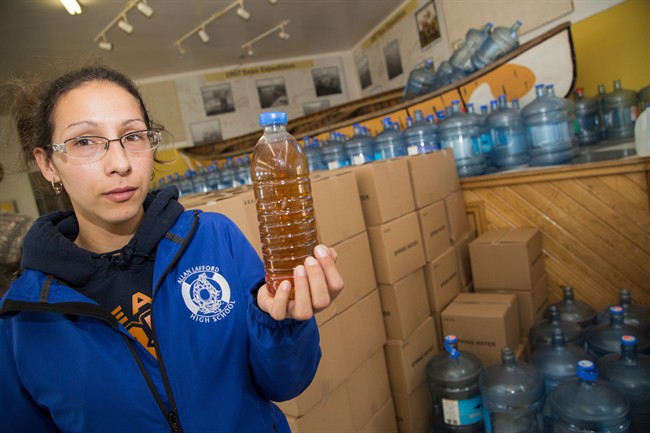A Nova Scotia Indigenous community struggling with dark, foul-smelling tap water is calling on the federal government to fix a problem that has lingered for a decade.

Potlotek First Nation residents have been told not to drink, bathe or wash clothes in the water, which has high levels of iron and manganese.
“You see black water coming out of the tap and it doesn’t smell nice,” John Paul, executive director of the Atlantic Policy Congress of First Nations Chiefs, said in an interview Thursday.
“It lasts for about a month every year. It’s horrible.”
Chief Wilbert Marshall said the community of about 500 people has been working with Ottawa on a solution for 10 years, but residents still don’t have clean, reliable drinking water.
“In spite of promises for action, here we are a decade later and no action. What must happen to address this water crisis here in our community?” he said in a statement.
READ MORE: Federal government focuses on improving drinking water at Alberta First Nation
A Health Canada spokeswoman said the spike in minerals is related to seasonal factors such as temperature changes and turnover in the nearby lake water, and although levels should decline there is no set time frame for the water to return to normal.

Get weekly health news
Maryse Durette said there are no known health impacts tied to the reported levels of iron and manganese, but that boiling the water would only further concentrate the minerals.
The Cape Breton Mi’kmaq community, formerly known as Chapel Island First Nation, is relying on bottled drinking water and public shower facilities.
Chief Candice Paul of St. Mary’s First Nation in New Brunswick called the water issues “a real tragedy.”
“Prime Minister Trudeau committed to address this situation and still, we see no action in communities,” she said in a statement. “I thought we were working to solve this problem but the reality is, nothing is happening.”
WATCH MORE: After years of living with unsafe drinking water, Harrietsfield residents ‘forced’ to lay charges

John Paul said the situation is extremely challenging for the elderly, sick or families with young children.
“They were very angry a year ago and now they’re just beside themselves,” he said.
“They’re getting tired of promises and no action.”
Indigenous and Northern Affairs Canada spokeswoman Stephanie Palma said the department reached out to the Potlotek First Nation to ensure that drinking water, temporary laundry facilities, showers and washrooms are available to the community.
She said a working group made up of a consultant and representatives from the community, the department and Health Canada was formed a year ago to come up with solutions to the water problem.
Palma noted that feasibility studies and interim repairs to the existing system have been completed at a cost of $841,000, while design work is underway for the installation of a new water treatment system.
Ottawa has committed to end all long-term drinking water advisories affecting on-reserve water systems by 2021, she said.







Comments
Want to discuss? Please read our Commenting Policy first.